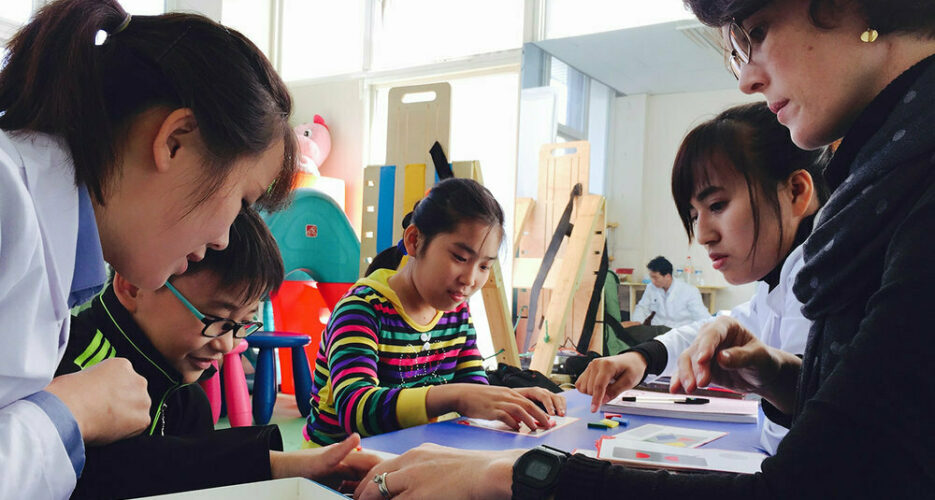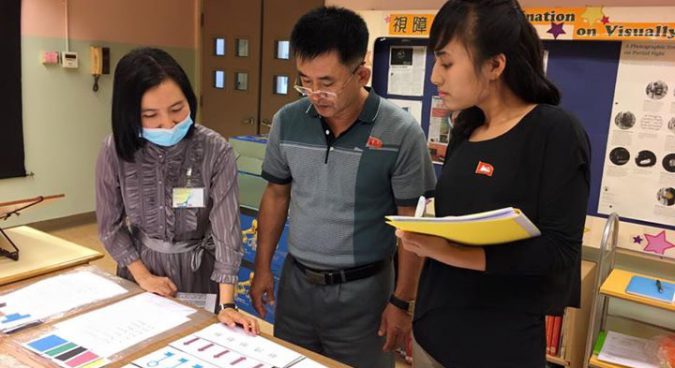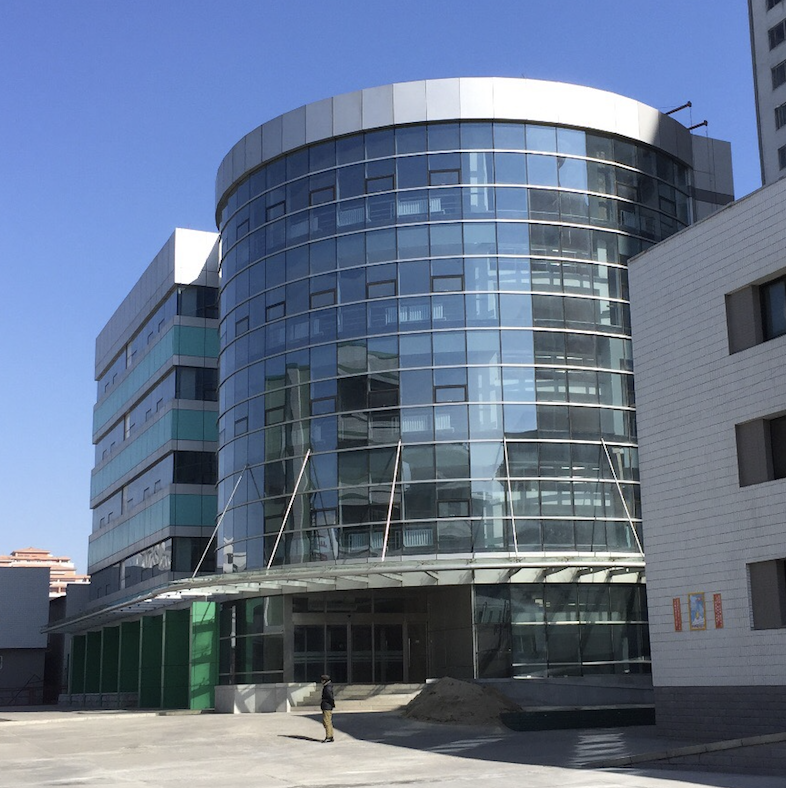'강제동원 피해' 세 갈래 해법..접점 찾을까, 후폭풍 부를까
김소연 입력 2019.11.27.
거센 반발 부딪힌 '문희상 안'
한·일 기업 기부금+성금+60억
입법화 추진에 피해자·단체 반대
"갈등 봉쇄 의도" 문 의장에 항의
피해자 '공동요구안'..정부는 '1+1안'
소송 피해자 논의 통해 12월 발표
"일 사실 인정·사과 반드시 포함"
정부, 문희상안 거리 두며 의견수렴
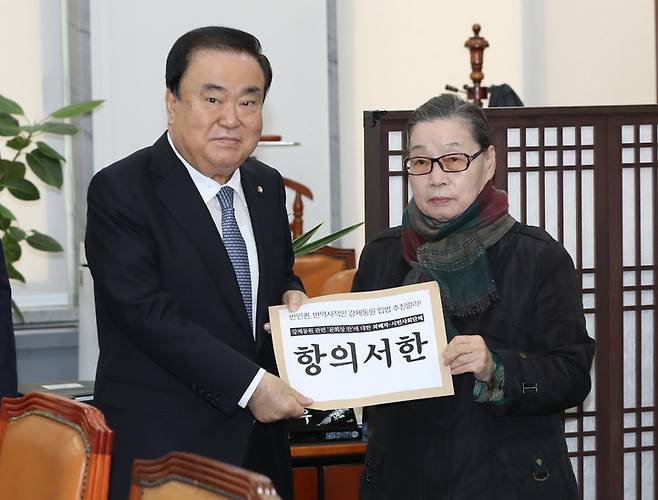 이미지 크게 보기강제동원공동행동, 정의기억연대 등 피해자, 시민사회단체 관계자가 27일 오후 서울 여의도 국회를 방문해 문희상 국회의장에게 문 의장이 제시한 강제동원 피해자 배상 해법에 대한 항의서한을 전달하고 있다. 연합뉴스
이미지 크게 보기강제동원공동행동, 정의기억연대 등 피해자, 시민사회단체 관계자가 27일 오후 서울 여의도 국회를 방문해 문희상 국회의장에게 문 의장이 제시한 강제동원 피해자 배상 해법에 대한 항의서한을 전달하고 있다. 연합뉴스일제 강제동원 피해자 문제를 놓고 문희상 국회의장 안, 정부안, 소송에 나선 피해자 중심으로 요구안이 만들어지고 있는 등 해법을 찾기 위한 움직임이 활발하다. 하지만 ‘문희상 안’을 두고 피해자들과 관련 시민사회단체들이 강하게 반발하고 있어, 입법화가 되면 큰 후폭풍이 예상된다.
27일 문희상 의장 쪽 관계자들 말을 종합하면, 한·일 기업 기부금과 국민의 자발적 성금, 2015년 한-일 정부 간 합의로 만들어졌다가 해산된 ‘화해·치유재단’에 일본이 냈던 기금의 잔액 60억원으로 강제동원 피해자들에게 ‘위자료’를 지급하는 내용으로 입법화가 추진되고 있다.
이를 기초로 문 의장이 ‘기억인권재단’을 만들어 3천억원의 기금을 모아 소송에 나선 피해자 1인당 2억원씩 1500명에게 위자료를 지급하겠다는 방안이 보도되기도 했지만, 문 의장실은 이에 대해 “초안일 뿐, 지금은 내용과 액수 등이 많이 바뀌었다“고 밝혔다. 문 의장실은 26일 강제동원 피해자들을 비공개로 만나고, 27일에는 관련 법안을 발의한 여야 의원들의 의견을 들었다.
‘문희상 안’에 대해 일본에선 긍정적 신호가 나오지만, 정작 대법원 승소 판결을 받은 소송 피해자들을 비롯해 시민사회단체가 강하게 반발하고 있다. 소송에 참여한 피해자 쪽 관계자는 “문희상 의장 안은 전체 강제동원 피해자까지 아울러 역사적 관점으로 잘 해결하려는 게 아니라, 한-일 갈등의 불씨를 없애도록 관리를 하겠다는 것”이라고 비판했다. ‘일본군 성노예제 문제해결을 위한 정의기억연대’와 ‘강제동원 문제해결과 대일과거청산을 위한 공동행동’ 등 피해자 단체와 시민사회단체는 이날 오후 국회 정문 앞에서 기자회견을 열고 “문희상 의장 안은 일본 정부와 기업의 책임을 흐리고, 무효화된 2015년 위안부 합의를 되살리려 하는 것”이라며 “피해자들을 모욕하지 말라”고 비판했다. 이들은 국회를 방문해 문 의장에게 항의서한을 전달했다.
이와 별도로 소송중인 강제동원 피해자들은 논의의 실효성을 높이기 위해 ‘공동 요구안’을 마련하고 있다. 이에 참여하고 있는 관계자는 “일본의 사실 인정과 사과는 변할 수 없는 전제라는 것이 요구안에 들어간다”며 “12월 안에 요구안을 내놓을 것”이라고 말했다.
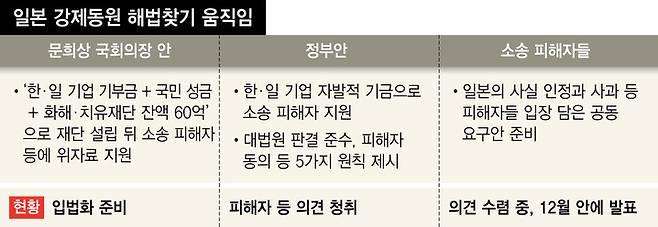 이미지 크게 보기
이미지 크게 보기한편, 정부 지원도 받지 못하고 소송에도 나설 형편이 되지 않는 피해자들도 해법 마련 움직임에 상당한 관심을 보인다. 지난 26일 서울 종로 일제강제동원피해자지원재단에서 문희상 의장실이 개최한 피해자 간담회에는 애초 40석이 준비됐으나 100여명 넘게 모여 “왜 우리는 못 들어가냐”며 고성을 지르기도 했다. 강원도에서 온 홍영숙 ‘태평양전쟁 한국인 희생자 유족회’ 회장은 “강제동원 피해자로 인정 받았지만, 살아 돌아왔다는 이유로 아무 지원도 받지 못하고 있다”며 “소송은 극소수만 할 수 있다. 문희상 의장 안으로 피해자 일부만 지원하면 갈등은 계속될 수밖에 없다. 보훈 혜택 등 실질적 조치를 해달라”고 요구했다. 하지만, 일부 피해자·유족단체들은 “문희상 의장의 법안이 처리돼 피해자들의 보상과 명예가 회복될 수 있도록 촉구한다”고 지지하는 청원서를 내는 등 피해자들 내부에서도 이견이 크게 엇갈린다. 강제동원 피해자는 150만~200만명으로 추산된다.
한·일 기업의 자발적 기금으로 소송 피해자 문제를 해결하자는 ‘1+1’안을 지난 6월 일본에 제안했던 정부는 아직까지 구체적 안을 만들기보다, 대법원 판결 준수, 피해자 동의 등 5가지 원칙을 지키겠다며 피해자 의견 수렴에 집중하고 있다. 정부는 ‘문희상 안’에는 거리 두기를 하는 모양새다. 정부 관계자는 “문희상 의장 안은 일본 쪽의 책임을 묻지 않는 등 대법원 판결과 어긋나는 면이 있다. 정부에서는 진지하게 검토되는 안은 아니다”라고 말했다.
김소연 이완 김민제 기자 dandy@hani.co.kr
ⓒ 한겨레신문사, 무단전재 및 재배포 금지
 옆집형21시간전
옆집형21시간전문희상 헛짓거리 하지마 박그내가 한것과 뭐가 다르냐
답글 작성댓글 찬성하기25댓글 비추천하기1
 들꽃19시간전
들꽃19시간전징용과 위안부 문제를 묶어 일본 속편하게 한꺼번에 면죄부 주는 참으로 매국노스런 짓이다 상식적 사고가 안되면 치매 검사좀 하고 정치은퇴하길 바란다 국민의 한을 마치 귀찮은 골치거리로 여기듯 한번에 처리하겠다는 정신병자 수준의 사고다 일본에 받아달라고 애원하는 꼴이라니 기가 차다 해법은 일본이 내는것이 아니라 상식인데 마치 한국이 아쉬운듯 저자세니 기가 차다 죽을라고 환장했나 문희상은 당장 사과하고 철회한후사퇴하라 ♬♩
답글 작성댓글 찬성하기8댓글 비추천하기0
 개벽20시간전
개벽20시간전문희상도 아베에게 먹혔구만 우리성금으로 보상을왜하고 우리기업이 왜기부를하나 완전+돌이네 일본이 정식사죄도 없고 친일처럼 생겨가지고서리 ...
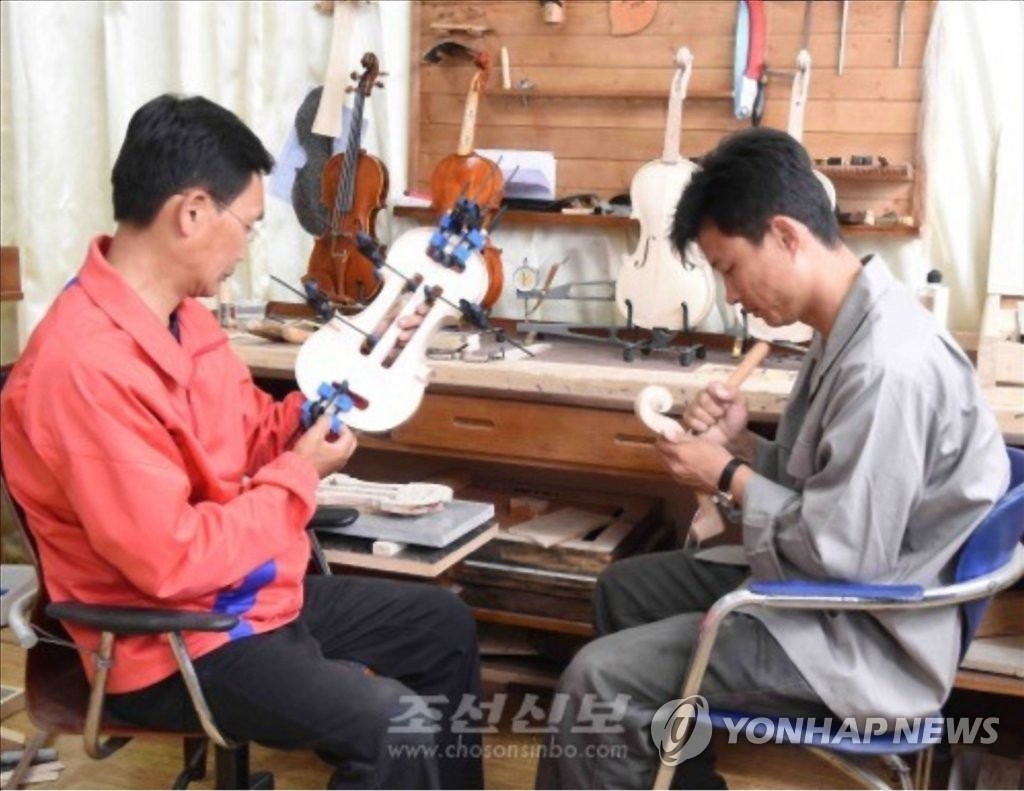


 지난 9월 29일 경기도 용인시 기흥구 한국민속식물원에서 열린 북한 채소종자지원 선적식
지난 9월 29일 경기도 용인시 기흥구 한국민속식물원에서 열린 북한 채소종자지원 선적식
